Plextor Updates The Firmware on M5 Pro: Promises Increased Performance, We Test It
by Kristian Vättö on December 10, 2012 2:30 PM ESTEarlier this week Plextor put out a press release about a new firmware for the M5 Pro SSD. The new 1.02 firmware is branded "Xtreme" and Plextor claims increases in both sequential write and random read performance. We originally reviewed the M5 Pro back in August and it did well in our tests but due to the new firmware, it's time to revisit the M5 Pro. It's still the only consumer SSD based on Marvell's 88SS9187 controller and it's one of the few that uses Toshiba's 19nm MLC NAND as most manufacturers are sticking with Toshiba's 24nm MLC for now.
It's not unheard of for manufacturers to release faster firmware updates even after the product has already made it to market. OCZ's Vertex 4 is among the most well known for its firmware updates because OCZ didn't provide just one, but two firmware updates that increased performance by a healthy margin. The SSD space is no stranger to aggressive launch schedules that force products out before they're fully baked. Fortunately a lot can be done via firmware updates.
The new M5 Pro firmware is already available at Plextor's site and the update should not be destructive, although we still strongly suggest that you have an up-to-date backup before flashing the drive. I've compiled the differences between the new 1.02 firmware and older versions in the table below:
| Plextor M5 Pro with Firmware 1.02 Specifications | |||
| Capacity | 128GB | 256GB | 512GB |
| Sequential Read | 540MB/s | 540MB/s | 540MB/s |
| Sequential Write | 340MB/s -> 330MB/s | 450MB/s -> 460MB/s | 450MB/s -> 470MB/s |
| 4KB Random Read | 91K IOPS -> 92K IOPS | 94K IOPS -> 100K IOPS | 94K IOPS -> 100K IOPS |
| 4KB Random Write | 82K IOPS | 86K IOPS | 86K IOPS -> 88K IOPS |
The 1.02 firmware doesn't bring any major performance increases and the most you'll be getting is 6% boost in random read speed. To test if there are any other changes, I decided to run the updated M5 Pro through our regular test suite. I'm only including the most relevant tests in the article but you can find all results in our Bench. The test system and benchmark explanations can be found in any of our SSD reviews, such as the original M5 Pro review.
AnandTech Storage Bench
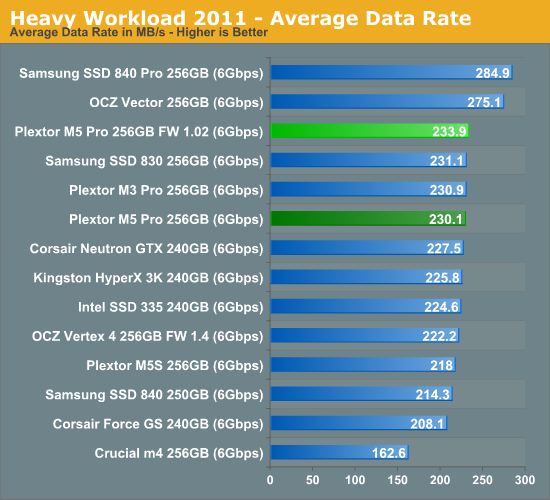
In our storage suites, the 1.02 firmware isn't noticeably faster. In our Heavy suite the new firmware is able to pull 3.8MB/s (1.7%) higher throughput but that falls within the range of normal run to run variance. The same applies to the Light suite test where the new firmware is actually slightly slower.
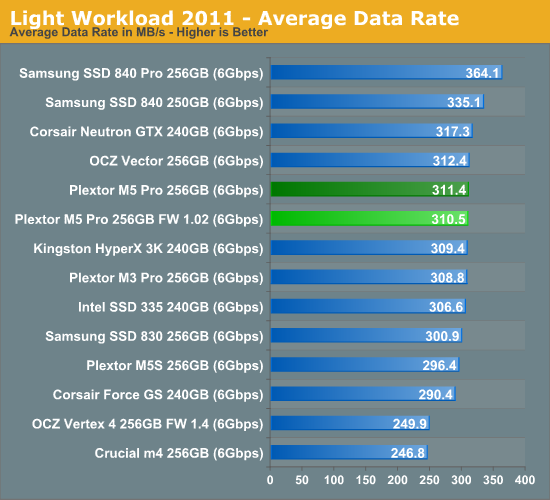 '
'
Random & Sequential Read/Write Speed
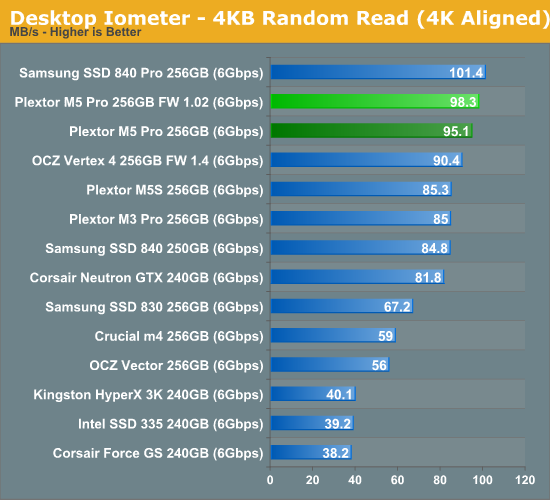
Random speeds are all up by 3-5%, though that's hardly going to impact real world performance.
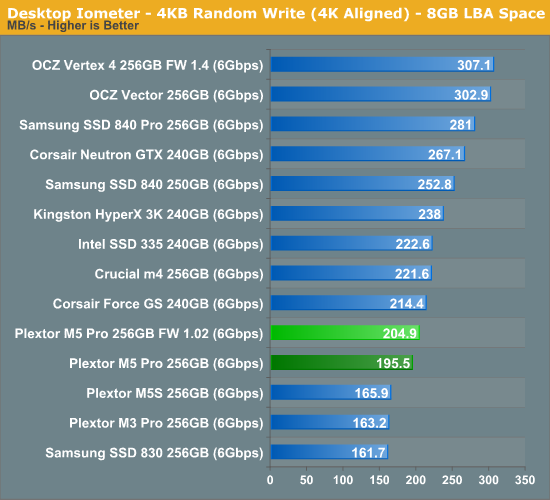
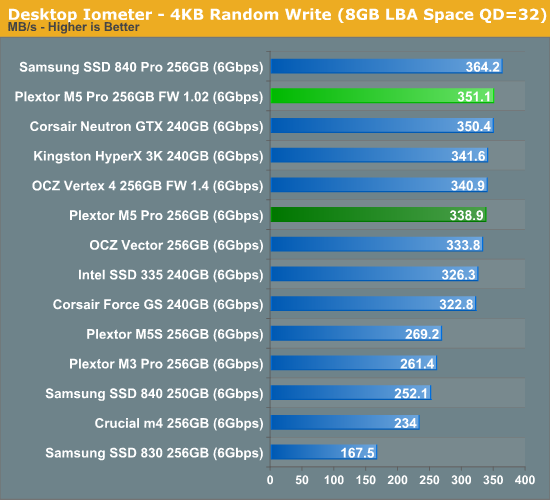
Sequential speeds are essentially not changed at all and the M5 Pro is still a mid-range performer.
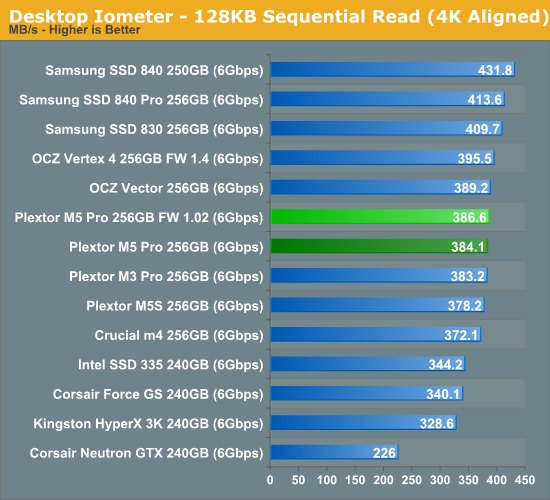
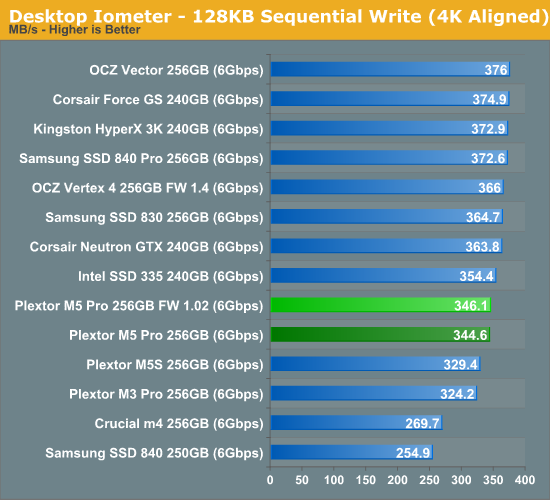










46 Comments
View All Comments
Beenthere - Monday, December 10, 2012 - link
Unless the 1.02 firmware corrects some Bug or other issue, it's hardly worth the effort to update. As far as the listed SSDs, few if anyone would actually be able to tell the difference in performance between the various drives in actual use. The synthetic benches produce theoretical differences which can't be seen by typical desktop or lapto users.Jocelyn - Monday, December 10, 2012 - link
Any chance we'll see Steady State testing with the M5 Pro for comparison?Jocelyn - Monday, December 10, 2012 - link
Had no idea this was a multi part review, sorry and Thank You :)jwilliams4200 - Monday, December 10, 2012 - link
"The peaks are actually high compared to other SSDs but having one IO transfer at 3-5x the speed every now and then won't help if over 90% of the transfers are significantly slower."Just a note that the statement quoted above is misleading. From your graphs, you can see that the Plextor is cycling between 100 IOPS and 32,000+ IOPS (there are a scattering of points in between, but the distribution is predominantly bimodal). So it is hardly "3-5x the speed". The peaks are actually more than 300x the low speed. So the average throughput depends almost entirely on what percentage of the time the SSD spends at the 32,000+ IOPS speed. It is easy to see that adding 20% or 25% OP allows the Plextor to spend a larger percentage of its time at the high speed.
In my testing, the throughput peaks always last about 0.4sec, but at 0% OP they only occur with a period of about 7 seconds, while at 20% OP the peaks occur with a period of about 1.4 seconds, so the average throughput increases by about a factor of 5 (= 7 / 1.4) when comparing 20% OP to 0% OP. Incidentally, the SSD is spending about 30% of its time in the high-speed mode with 20% OP, but only about 6% of its time in the high-speed mode with 0% OP.
chrnochime - Monday, December 10, 2012 - link
jwilliams. Got a few models of SSD that you'd recommend for reliability? I have a plextor M3 pro 120 GB and I'm thinking of buying a second one, probably 128, maybe 256. Samsung 830 is hard to find cheap now, so I'm looking at the Samsung 840 pro/Plextor M5 pro/Corsair/Kingston new ones released in the past 3 months.Thanks.
jwilliams4200 - Monday, December 10, 2012 - link
At the moment, I think the Plextor M5P is probably the highest quality consumer SSD that you can buy. It has been out for more than 4 months and I have not seen any real bugs or defects reported. I like that Plextor publicizes the details of the tests they do for qualification as well as their production tests, and they are tough tests, so you know that the shipping SSDs that have passed those tests are high quality.Now, I am assuming that you are not going to be subjecting the SSD to sustained heavy workloads like an hour of 4KQD32 writes. The M5P can do that of course, but if that were your main type of workload, there are higher performance choices like the Samsung 840 Pro or the Corsair Neutron GTX. But the 840 Pro has not been out long enough for me to call it high quality, and the Neutron and Neutron GTX do have a few reports of failures that may (or may not) be indicative of lower quality than the Plextor.
JellyRoll - Tuesday, December 11, 2012 - link
In steady state the 840 is ridiculously good compared to other SSDs.chrnochime - Tuesday, December 11, 2012 - link
Thank you for the detailed explanation! Much appreciated.I guess I can go ahead and search for good deals on M5P. I put reliability and durability(as in how long the drive can last) above all else. A slower speed that makes the drive that much longer is much more preferable to me.
Kristian Vättö - Tuesday, December 11, 2012 - link
Oh, what I meant was that Plextor's peak throughput is around 3-5x the peak throughput of other SSDs.JellyRoll - Tuesday, December 11, 2012 - link
The consistency testing is totally irrelevant for consumer workloads. Testing 4k full span random writes is ridiculous on an consumer SSD. This will NEVER be seen by any user outside of an enterprise scenario. This type of testing has been done for ages with enterprise SSDs by several sites. Never for consumer SSDs as its irrelevance is obvious.Then mix in the fact that this is done without a filesystem (which no user could ever do because they need this little thing called an 'operating system) and to top it off with absolutely no TRIM in play. without a filesystem there is no TRIM. What exactly are you recreating here that is of relevance?